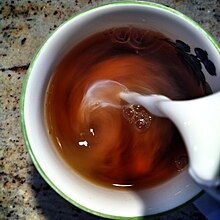Milk tea


Milk tea refers to several forms of beverage found in many cultures, containing some combination of tea and milk. Beverages vary based on the amount of each of these key ingredients, the method of preparation, and the inclusion of other ingredients (varying from sugar or honey to salt or cardamom).[1] Instant milk tea powder is a mass-produced product.[2]
Variations
Local variations include:
- Bubble tea, also known as pearl milk tea or boba milk tea, a Taiwanese tea-based drink invented in Taichung in the 1980s
- Cambric tea, a sweetened hot-milk beverage, often made with a small amount of tea[3]
- Hong Kong-style milk tea, black tea sweetened with evaporated milk originating from the days of British colonial rule in Hong Kong
- Doodh pati chai, literally 'milk and tea leaves', a tea beverage drunk in India, Pakistan, Nepal, and Bangladesh
- Teh tarik, a kind of milk tea popular in Malaysia and Singapore
- Suutei tsai, a salty Mongolian milk tea
- Shahi haleeb, a Yemeni milk tea served after chewing qat
- Masala chai, also known as masala tea, is a spiced milk tea drunk in the Indian subcontinent
- Irani chai, a type of milk tea made with pure milk mixed with mawa, prepared in Iranian-style cafes in Hyderabad, India
- Thai tea, a sweet tea-based drink popular in Southeast Asia
- Royal milk tea, a Japanese preparation that involves decocting tea in milk[4]
- Dalgona milk tea, milk tea sweetened with traditional Korean dalgona, a honeycomb-like toffee[5]
In Britain, when hot tea and cold milk are drunk together, the drink is simply known as tea due to the vast majority of tea being consumed in such a way. The term milk tea is unused, although one may specify tea with milk if context requires it. This may cause confusion for people from cultures that traditionally drink tea without milk.
Popular culture
Milk Tea Alliance
The Milk Tea Alliance is a term used to describe an online democratic solidarity movement made up of netizens from Thailand, Hong Kong, and Taiwan.[6][7] The Milk Tea Alliance arose in response to the increased presence of Chinese trolls and nationalist commentators on social media.[8][9] Milk tea is seen as a symbol of anti-China solidarity by southeast asians because in many southeast asian countries tea is historically consumed with milk while in China it is not.[10] Australia has also been suggested to be a member of the Milk Tea Alliance, however the relation to milk tea is tenuous with the milk product Aptamil standing in for an actual variety of milk tea in imagery.[11]
The "Milk Tea Alliance" moniker emerged in 2020 after Chinese nationalist Internet commentators criticised the Thai actor Bright for "liking" an image on Twitter which referred to Hong Kong as a "country", and called for a boycott of his TV programme. Twitter users in Taiwan, Hong Kong, and the Philippines joined Thai users in what The Telegraph called "a rare moment of regional solidarity".[12] Following the 2020 China–India skirmishes India has also been included in some formulations of the Alliance with masala chai being their representative variety of milk tea.[10]
Pallabi Munsi, writing in OZY, described the Milk Tea Alliance taking on 50 Cent Party and Little Pink as "Asia's volunteer army rising against China's internet trolls."[13]
References
- ^ "Franchise battle stirring up Vietnamese milk tea market". VietNamNet. September 15, 2017. Retrieved September 22, 2017.
- ^ Zeng, Z.; Wang, J. (2010). Advances in Neural Network Research and Applications. Lecture Notes in Electrical Engineering. Springer Berlin Heidelberg. p. 894. ISBN 978-3-642-12990-2. Retrieved September 22, 2017.
- ^ "Definition of CAMBRIC TEA". www.merriam-webster.com.
- ^ "밀크티" [Milk]. 시사상식사전, 박문각 (in Korean). Naver. Retrieved March 22, 2018.
- ^ "The real Dalgona coffee, in Korea | Eat Your World". eatyourworld.com. Retrieved 2020-04-30.
- ^ Tanakasempipat, Patpicha. "Young Thais join 'Milk Tea Alliance' in online backlash that angers Beijing". mobile.reuters.com. Reuters. Retrieved 18 April 2020.
- ^ Bunyavejchewin, Poowin. "Will the 'Milk Tea War' Have a Lasting Impact on China-Thailand Relations?". thediplomat.com. The Diplomat. Retrieved 4 May 2020.
- ^ McDevitt, Dan. "'In Milk Tea We Trust': How a Thai-Chinese Meme War Led to a New (Online) Pan-Asia Alliance". thediplomat.com. The Diplomat. Retrieved 18 April 2020.
- ^ Lau, Jessie. "Why the Taiwanese are thinking more about their identity". www.newstatesman.com. New Statesman. Retrieved 15 May 2020.
- ^ a b Deol, Taran. "'We conquer, we kill': Taiwan cartoon showing Lord Rama slay Chinese dragon goes viral". theprint.in. The Print. Retrieved 18 June 2020.
- ^ Everington, Keoni. "Photo of the Day: Australia joins Milk Tea Alliance with Taiwan". www.taiwannews.com.tw. Taiwan News. Retrieved 30 April 2020.
- ^ Smith, Nicola (3 May 2020). "#MilkTeaAlliance: New Asian youth movement battles Chinese trolls". The Telegraph.
- ^ Munsi, Pallabi (2020-07-15). "The Asian Volunteer Army Rising Against China's Internet Trolls". OZY. Retrieved 2020-07-30.
{{cite web}}: CS1 maint: url-status (link)
Further reading
- "Milk-tea-flavored bottled water". Japan Today. Retrieved September 22, 2017.
External links
 Media related to Milk tea at Wikimedia Commons
Media related to Milk tea at Wikimedia Commons
